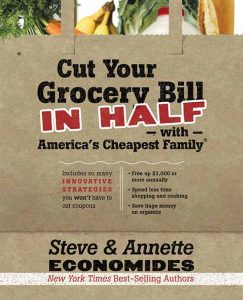A summary review of Steve and Annette Economides’ Cut your grocery bill in half with America’s cheapest family
*****
Is it possible? The title of Steve and Annette Ecomides’ book Cut your grocery bill in half really caught my attention. Who doesn’t like to save a dime? Or actually cut half off your entire grocery bill? Wow.
While I have 3 young kids I still feel new to the role of stay-at-home mom, homemaker, wife, and all the adventures that brings! One thing I realized early on in my role was how much of my life now revolved around food: preparing meals, cooking, serving, eating and cleaning them up 3 times/day, plus baking, some gardening, and canning/freezing produce in the fall, plus other miscellaneous activities such as blending and freezing baby food and making meals or baking for other families or events, and, yes, grocery shopping.
MAMA KNOWS BEST
I think I am like a lot of RP-readers. I was raised by thrifty parents: we grew up in hand-me-downs and ate a lot of potatoes. We rarely ate out at restaurants (unless it was McDonald’s, with coupons). We baked cookies every week for school lunches and squares for after-church coffee. With groceries, Mom always had a list that she stuck to, she used coupons, she bought in bulk, and she knew her prices well.
As a mom now myself, and “head-grocery-shopper” in my own little family, I’ve tried to follow my mom’s lead. My parents seemed to have good spending skills and I wondered if this book could truly challenge my skills (and even my mom’s) to really be able to cut our grocery bills in half. It turns out though, it was worth a read!
I have attempted to summarize some of my findings below, while adding my own thoughts. I am certainly no expert in this. Perhaps my mom should have been recruited to write this, or some of our grandmothers who have all sorts of cost-saving tricks up their sleeves! Don’t many of our grandmas reuse tin foil, wash and reuse ziplock bags, and use yogurt containers as Tupperware? Do I? Does this generation? Should we? Is it wrong if we don’t? The topic is endless! I feel as though grocery bills are scraping the surface of the larger issue at hand: being a Christian steward.
A COUPLE WITH A PASSION FOR SAVING MONEY
The authors, Steve and Annette Economides are a husband and wife team with 5 children. They are really passionate about saving money, eating well, and spending time together as a family. In their opening chapter they write “We are on a crusade to convince the world that frugality produces freedom (and fun) while a debt-riddled lifestyle only produces distress (and destruction).” While they are Christian, the book is not explicitly so (the only extended mention made of God’s call for us to be stewards comes in the last chapter, which seems slightly tacked on).
I respect their mission and appreciate the experiences they have been through (e.g. living on a limited income as newlyweds), and I believe that much of America (and of course Canada!) can learn from them, “America’s cheapest family.” I heard recently that 50% of Canadians spend more than they earn. It is easy to see that if we spend more than we make there will be significant consequences! Are we being blinded by the materialistic, keep-up-with-the-Jones, buy-now-pay-later mentality that society bombards us with daily?
SO WHAT CAN WE DO?
Bringing this back to our grocery bills, what do the Economides advise?
Skimming the book’s table of contents quickly shows some of the key areas of focus. Planning ahead, being shopper-savvy (e.g. buy in bulk, no impulse buying etc.), coupon use, cooking to save money, stocking up on items, and useful tools (e.g. consider buying a meat grinder to grind your own meat).
They also dedicate a chapter to promoting families eating together, as well as a chapter to feeding kids for less (e.g. how to make your own baby food, filling up hungry teens on inexpensive snacks such as air-popped popcorn). Finally, they discuss how to eat out at restaurants wisely and in moderation, and the benefits of gardening. Bonus material also includes how single people or couples without kids can save on money (e.g. buy in bulk and share savings with other singles or couples). Several tried and true family recipes finish off the book.
1. PARTICULAR PLANNING
The Economides recommend planning a monthly menu for all meals, and they offer steps on how to do this effectively by considering what is already in your pantry at home, what’s on sale in the grocery store, and what’s practical for your schedule. They compare prices and sales from different supermarkets and carefully plan what is best to buy where and when. Learn to be organized. List meals for breakfast, lunch, and dinner, and brainstorm on how to use leftovers best. Waste nothing. Don’t let food spoil. Aim to go grocery shopping only once a month (store fresh produce correctly so it lasts, and freeze your milk and thaw when needed). Eat what is in season; if you crave asparagus wait until it is on sale! And no picky eaters allowed!
2. SUPER SHOPPER
Always take a shopping list. They suggest taking a calculator to keep track of the amount you are spending as items enter your cart. Use coupons. No impulse buying allowed – e.g. resist the urge to buy something just because it looks delicious and you are hungry! Know your prices on items and snag sales when you see them. Buy in bulk. Browse the discount/clearance shelf. Be assertive and ask for a rain check if a sale item is out of stock. Always double check your receipt to be sure you paid the correct prices.
3. CUE UP THE COUPONS
Coupons save you money. Take the time to collect them, cut them out, and use them. The savings add up. The authors offer tips on how to organize your coupons best. They touch on the idea of coupon stacking – sometimes it is possible to put several coupons towards one item and get it steeply discounted. Sharing or trading coupons with friends can be helpful. Look online for coupons. But, they warn, keep coupons in perspective – don’t get obsessed by them, don’t get caught up in the thrill and “game” of saving money when it starts to take over your life!
4. COOK AND SAVE
Annette Economides admits she did not know a lot about cooking when she first married Steve. She offers hope that anyone can learn to cook and should! Home-cooked meals are healthier, often have less calories, and are cheaper. Grind your own meats! Learn the spice rack and use your knowledge to keep simple dishes tasty and interesting.
The Economides believe in “once-a-month-cooking” days. Time is saved when you double (or quadruple) a recipe. Meal swap with others. Knowing you have meals frozen in your freezer combats the temptation to eat out or buy convenient foods.
5. STOCK THE SHELVES
Know the shelf life of your items – stock up and keep track. Stay organized. The Economides list over 40 items that they find most helpful to keep stocked up. Like in other chapters, many practical tips are dispersed among the information. For example, they suggest having a rule that sweet cereals (e.g. Froot Loops) can only be eaten when mixed with a healthy (and often cheaper) cereal (e.g. Corn Flakes). They also discuss setting up your kitchen cupboards and fridge most efficiently. They advocate reusing containers and bags. 
And they love their freezer! It is a 25 cubic foot chest freezer, well-organized. They list tips on how to freeze things best, and offer advice on overall freezer use. They write, “A mainstay of our money-saving philosophy is buying storable food on sale – stockpiling as much as we can safely store – and slowly depleting that supply over several months.”
6. TOOL TIME
Everyone needs a spoonula! Maybe they are more commonly called (or miscalled) spatulas – the kitchen spoon-type scraper that allows you to clean out a container or pot nearly spotlessly.
The Economides love their KitchenAid Mixer, though they admit it may be a luxury item. Yet, the attachments they bought for it, such as a meat grinder, have made the purchase more than worthwhile. They list various other kitchen tools they find to be essential such as plastic cutting mats (that can then be shaped to pour what you’ve cut up into your recipe without spilling a drop), blender (for making smoothies using up older fruits that may otherwise be unappetizing), Popcorn Air popper (popcorn kernels are very inexpensive and air-popped corn compared to microwave popcorn makes for a healthier snack) etc.
COULD YOU CUT YOUR GROCERY BILL IN HALF?
The book is packed with so many tidbits of information on how to save money. It is worth a read. Even adopting just a few ideas will guarantee more money stays in your wallet than before. Even though many ideas seem to show just a small amount of money is saved (e.g. using a coupon to save 50 cents), the savings compound to a significant impact!
Saving money on your groceries seems to be about taking on a frugal mindset. It becomes a mentality. Not something to obsess over, but something that we could all probably be more aware of.
So could I cut my grocery bill in half? I think it depends on your starting point. When I read the book I felt I was doing several of their strategies already, but that I could certainly expand and improve on a lot of them. If I was someone who was used to eating out a lot, buying pre-made convenient foods, insistent on purchasing only the more expensive brands, and didn’t care about sales, I might have a different story. Which leaves us with the question, RP-readers, what kind of shopper are you? Could you cut your grocery bill in half?
This article first appeared in the September 2013 issue.














